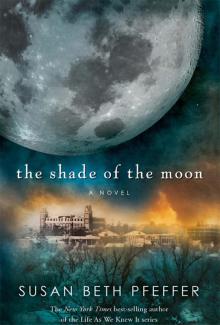- Home
- Susan Beth Pfeffer
The Beauty Queen
The Beauty Queen Read online
EARLY BIRD BOOKS
FRESH EBOOK DEALS, DELIVERED DAILY
LOVE TO READ?
LOVE GREAT SALES?
GET FANTASTIC DEALS ON BESTSELLING EBOOKS
DELIVERED TO YOUR INBOX EVERY DAY!
The Beauty Queen
Susan Beth Pfeffer
To David, Ellen, and Michael Conford
Chapter 1
The scene was bizarre. We were at Morris Lake (“Great Oaks’ Great Lake,” actually an oversized pond), fifteen of us, wearing tank bathing suits, all bought for the Miss Great Oaks Beauty Contest. There we were, sitting on a shaky wooden stage, while Jack Davis, who ran the local turn-the-other-way-when-underage-kids-come-in bar, was singing “My Wild Irish Rose.” On his right were twenty middle-aged men, dressed in white slacks and yellow shirts, while their leader floated in a sea of ostrich feathers, pasted all over his shirt and pants, and strange cardboard growths, meant to represent wings. The yellow-shirt-and-feather contingent was from one of the less exclusive fraternal groups. They were at the contest to play “The Star-Spangled Banner,” but they were paying more attention to us than to their instruments. The town’s American Legion post sponsored the contest. They were sitting in full uniform in the first four rows on the other side of the lake, ogling us. With them were various relatives, like my mother, and boy friends of the contestants (mine fortunately was at home, and completely ignorant of what was going on), as well as the newspaper’s chief photographer. The Miss Great Oaks Beauty Contest was an event of great local importance. I couldn’t see why. The contestants were just ordinary girls, mostly kids I’d gone to high school with, but not the smart kids, or the rich ones. Just the crowd I would have been in if I hadn’t been so involved in theater.
But given the excitement level in Great Oaks, it wasn’t that surprising the contest was such an event. Except for an occasional car crash, very little happened. It wasn’t so much a small town as a dull one. Even though there was a fair-sized college there, the usual town-gown problems didn’t break through the wall of boredom. The most exciting moment in the lives of most Great Oaks residents was when they left town.
Sitting next to me was Sharon Reeves. Sharon and I had been in the same gym class. Except for that, we had nothing in common.
“I’m surprised you’re here,” she whispered, since we weren’t supposed to talk during the entertainment.
“My mother talked me into it,” I said.
“Oh,” she said. “Jimmy said I should.”
Jimmy, I remembered vaguely, was Sharon’s steady. By now, he was probably her fiancé.
“Oh well,” I said, “fifty bucks is nothing to sneeze at.”
At which, Mr. Ostrich Feather sneezed loudly, causing a minor flurry. Sharon and I started giggling, and Mr. Davis, who was emceeing the affair, turned to us and said “Shush.” So Sharon and I stopped talking.
The whole thing was my mother’s idea. She had tried to talk me into it the year before, but I’d absolutely refused. This year, she was more persistent.
We were sitting in our living room, as ugly a room as I know. The furniture is left over from my mother’s married days, when she and my father bought everything on credit. The credit and my father had long since run out, but the furniture remained. It hadn’t been much to start out with, but years of neglect and abuse had made it even worse-looking. The sofa needed a new slipcover. The stuffing was coming out of the arm of one chair. The bookcase had been dusted so infrequently that the wood color was ash gray. We’d each done a little decorating in an effort to give the room more warmth. Mom bought little knickknacks from Wool-worth’s, heavily cute statuettes of children, dogs, and other things which she found a nuisance in real life. When I was twelve and aware for the first time that we were poor and tasteless, I smashed every figurine in the room, but one by one my mother had replaced them all. They were dusted even less frequently than the shelves. In a household of three women, there wasn’t a single housewife.
Marly, my little sister, had taste, and in the past couple of years had thumbtacked reproductions of Renoir and Van Gogh paintings to the wall. They were the only pictures we had, and their color added a note of desperate cheeriness. I contributed some candles that had been given to me as birthday presents. My friends know I don’t like being tied down by possessions, so they tend to give me things that are easily disposed of. My mother, who never liked candles, used them instead of a flashlight during a blackout last summer.
I was lying on the sofa, trying to look busy. Mom was flourishing the newspaper, open at an article about this year’s contest.
“How will it hurt?” she started.
“Well,” I said, “I could catch a cold waiting around Morris Lake.”
“Don’t be silly,” she said.
“And you’ll have to get me a bathing suit,” I said. “Contests like that don’t like bikinis.”
“It’s an investment,” she said. “You’ll need something decent for college anyway.”
“It’s ridiculous,” I said. “I’m sure lots of girls will be in the contest. I won’t win, and then I’ll be stuck with an ugly bathing suit and a runny nose.”
“You’re such a defeatist,” she said. “You’re the prettiest girl Great Oaks has ever seen. You could have any boy you want. You’re sure to win. Why, I’ll bet you go all the way and make it to the national contest.”
“You’re a dreamer,” I said. “Besides, that’s not what I want to do.”
“Why not? Is it too good for you?”
“It’s not a matter of good,” I said. “It’s just a waste of time.”
“There’s big money in these contests,” Mom said. “Scholarships, cars. You could make things a lot easier for me, for Marly, if you did it.”
“I couldn’t give my scholarship to Marly,” I said. “Besides, she won’t need it. Colleges are going to knock themselves out trying to get her.”
“Brains aren’t enough,” Mom said. “You need looks and personality, and Marly’s a little weak in both. And we’re hardly so rich that you can throw away real money on a whim.”
“Whim?” I said. “You’re the one who’s throwing away money on a bathing suit I’ll never wear.”
“You’ll wear it in college.”
“I’m not sure that I’m going to college.”
Mom didn’t pursue that one. “Lots of fine actresses got their starts in beauty contests,” she said instead.
“Lots of fine movie starlets did,” I said. “But I don’t plan to be a starlet.”
“Actresses too,” she said.
“Sure,” I said. “Name two.”
“Cloris Leachman,” Mom said. “I read about it in TV Guide.”
My mother commits TV Guide to memory. “Great,” I said. “I’ll take your word for it. Name another.”
“Do you deny she’s a good actress? She won an Academy Award you know.”
“I know,” I said. “I watched it with you. Name another.”
Mom thought about it. “Bess Myerson,” she said finally.
“Bess Myerson’s not an actress,” I said.
“I know, but she could be,” Mom said. “She chose to do more meaningful work. There, I’ve named two. Now will you do it?”
“What’s involved?” I asked, with a sigh.
“Nothing really,” Mom said. “You just walk around the lake, and they ask you a couple of questions, and then some judges decide which one should win. The winner gets a fifty-dollar savings bond.”
“Thrilling,” I said.
“A navy blue bathing suit,” Mom said. “You always looked good in navy blue. It brings out the auburn in your hair.”
“I trust your judgment,” I said, which I didn’t and never have.
“Good,” Mom said. “Because I’ve already gotten it.”
“Mom.”
“I knew you really wanted to do it,” she said. “It’s upstairs.” And she dragged me up there, and I admired the navy blue tank suit which I was now shivering in.
Even with the suit, I almost didn’t go. Marly came home and reminded us that the contest was the night of junior high school graduation.
“That’s much more important,” I agreed. “Marly, don’t worry about it, I’ll be there.”
Marly smiled at me.
“Wait a second,” Mom said. “You’re not getting out of it so fast.”
“What do you mean, not getting out?” I said. “I want to go to Marly’s graduation.”
“Marly, you wouldn’t want your sister to sacrifice her big chance, would you?” Mom asked.
“No,” Marly said.
“Big chance,” I said. “Mom, you are crazy. The absolute most I can hope to get out of this thing is a fifty-dollar savings bond. What kind of big chance is that?”
“We could use the money,” Mom said. “Not to mention the publicity.”
“Publicity?” I said. “Do you think a Flo Ziegfeld’s going to be in the audience? Ed Sullivan? Is that it? Are you waiting for Ed Sullivan to discover me?”
“Besides,” Mom said, ignoring me, “you only get two tickets, don’t you Marly?”
“Yeah, I think so.”
“Well that settles it. Kit can’t go anyway.”
“Why not?” I asked.
“Because your father is bound to come. So that’s one ticket right there. And you can’t expect me to miss Marly’s graduation.”
“I’m sure Marly could get me a ticket,” I said. “Besides, are you going to want to go if Dad does?”
“Your father and I are adults,” Mom said. “We can both sit in an auditorium together.”
I almost asked Marly who she’d prefer to have at graduation, me or Mom, but decided against it. Knowing Marly, she’d chose both of us and tell Dad not to come. Which would be foolish, since Dad was the one she really wanted.
“Okay,” I said. “I’ll go to the beauty contest, but only if Dad goes to graduation.”
Much to my pleasure, and a little to my surprise, Dad did show up, right on time. Of course, being Dad, he bungled the whole thing up.
“This is Sally,” he said, after we opened the door.
Sally was about thirty and very pretty. She gave the living room a quick glance and shuddered. “I’m pleased to meet you,” she said, after shaking hands. “Your father said it would be all right if I came.”
“Ed!” Mom shouted. “This is a respectable house. Don’t bring your girl friends here.”
“Sally is my fiancée,” Dad said. “I wanted her to meet the kids before the wedding.”
“Wedding,” Mom said. “And when is this wonderful event scheduled for?”
“Any day now,” Dad said.
“You must be Kit,” Sally said to me.
“Yes,” I said.
“And Marly,” she said. “Where’s Marly? Your dad talks about her all the time.”
“She’s upstairs getting dressed,” I said.
“Sally and I are going to graduation together,” Dad said. “If that’s okay with Marly.”
“There are only two tickets,” Mom said. “One for you, Ed, and one for me.”
“Oh dear,” Sally said. “I didn’t mean to cause any trouble.”
“No, of course not,” Mom said. “Neither did Ed, I’m sure. He just didn’t bother to think. He never does.”
“It’s no problem,” I said, because it was, and I didn’t want this evening ruined for Marly. “Mom, come with me to the beauty contest, and Dad and Sally can go to graduation. I’m sure Marly won’t mind.”
“Beauty contest?” Dad said.
“Miss Great Oaks,” I said. “It was Mom’s idea.”
“And a very good one,” Mom said. “With Kit’s looks, she’s bound to win.”
“For once, I think you’re right,” Dad said. “Kit, good luck with it.”
“Thanks,” I said. “The whole thing’s really dumb.”
“Go tell Marly about the change in plans,” Mom said. “And bring the bathing suit down to show your father.”
“Okay,” I said, glad to get out of there. I ran upstairs and knocked on our bedroom door.
“Come in,” Marly said.
“Change in plans,” I announced. “Dad’s here, but he’s brought some new girl friend. Says she’s his fiancée.”
“Oh,” Marly said. “Could you zip me? What does she look like?”
“Very nice,” I said, getting around to her back. “A little embarrassed.”
“Do you blame her?” Marly asked. “Thanks. Is Dad still going?”
“Yeah, but he’s bringing his girl. Sally. And Mom’s going to the contest with me.”
“Well that’s okay,” Marly said. “She’ll prefer that anyway, to some dumb graduation.”
“It’s not dumb at all,” I said. “I wish I could be there.”
“Well, Dad couldn’t make it to yours,” Marly said. “I guess this makes everything even, somehow.”
“Somehow,” I said. My graduation had been the week before, and Dad had to be on the road that day. Dad’s a salesman, living off of commissions and his charm. More often than not, one of them falls through. “I’m really proud of you,” I said. “First in your class. That’s quite an accomplishment.”
“It’s only junior high,” Marly said.
“It won’t be any different in high school,” I said. “I can’t wait until you make the valedictory.”
“I can hardly wait until I can say good-by to this whole stupid town,” Marly said. “Promise me if you become Miss Great Oaks, you’ll change things.”
“Sure,” I said. “They pay lots of attention to what us potential beauty contest winners say.”
“You’ll win,” Marly said. “You’re the most beautiful girl I’ve ever seen, even on TV. You’re bound to win.”
“Thanks,” I said. “I only wish it was something important.”
“And now Katherine ‘Kit’ Carson,” Jack Davis announced. The American Legion cheered my name. I got up and walked around the stage, making quarter turns to show off my body. Mom and a few other people clapped.
“Kit’s a graduate of our fine high school,” Mr. Davis told the audience. “She’s just turned eighteen. She’s five foot seven and weighs one hundred and sixteen choice pounds.”
I smiled, just the way I knew I should.
“You have beautiful hair, Kit,” Mr. Davis said. “What color do you call it?”
“My mother calls it auburn,” I said.
“Auburn,” Mr. Davis said. “That’s a rich man’s red.”
“I don’t know about that,” I said. “I’m not rich, and I’m not a man.”
“No, you certainly aren’t,” Mr. Davis said and burst into hearty laughter. The audience decided it was safe to laugh, and snickered.
“A girl with real brains inside that beautiful head,” Mr. Davis said. “Let’s give Miss Kit Carson a real big round of applause.”
The audience applauded. I smiled again and sat down.
After that, I sat and watched the other girls make fools of themselves. Most of them I knew by sight; some of them were acquaintances. None of them were real friends. Sharon tripped on her quarter turn and some of the yellow shirts laughed.
“All right now,” Mr. Davis said. “The judges now have the hard job of choosing between these fifteen lovely girls. I’m sure none of us envy them their work.”
The judges looked worried. They scribbled names on pieces of paper and consulted with each other at length.
They were obviously not professional beauty contest judges. Out of the five men, I recognized three. Officer Todd, reputed to be the town’s only honest policeman, Mr. Brooke, who ran the college bookshop, and Mr. Schwartz, assistant principal at the junior high, who once pinched me.
He, at least, had some credentials for the contest. I looked at Mom. I knew her fingers were crossed.
“Thank you gentlemen,” Mr. Davis said, as one of them handed him a sheet of paper. I stifled a yawn.
“All right, people,” Mr. Davis said. “The moment you’ve all been waiting for. Our second runner-up is little Miss Marjorie Sutz.”
Marjorie squealed and got up.
“First runner-up,” Mr. Davis said. “Now this is a very important job. Should Miss Great Oaks have to resign, our first runner-up takes over the title. Sort of a crown princess, you might say.”
The audience laughed some more.
“Our first runner-up is Laura Masters,” Mr. Davis said. “Let’s really hear it for Laura.”
The audience applauded some more.
“Now we have a real rarity in Miss Great Oaks herself,” Mr. Davis said. “I don’t think I’ve ever heard of this before.”
“It’s a tie,” Sharon whispered.
“We have a unanimous decision,” Mr. Davis said. “All five of our fine judges chose the same girl to be this year’s Miss Great Oaks. Not a vote of dissent for this very popular girl with the long, long legs and the auburn hair. This year’s Miss Great Oaks, the greatest Miss Great Oaks ever, Kit Carson.”
“Oh,” I said.
“Did you hear that folks?” Mr. Davis said. “This girl is so shocked all she can say is ‘Oh.’”
The audience laughed and applauded.
“Come here, Kit,” Mr. Davis said, and I walked over to the mike. “You must be a very excited little girl.”
I was two inches taller than Mr. Davis. “Very,” I said.
“Are your parents here tonight?” Mr. Davis asked.
“Just my mother,” I said. “My father’s at my sister’s graduation. She had the highest average in her junior high class.”
“Did you hear that folks,” Mr. Davis said. “A little closer to the mike, dear,” he whispered to me. “Your sister must be very proud of you.”
“I’m very proud of her,” I said.
“And you say your mother’s here?” he said. “Would Mrs. Carson please step up here. I’m sure all the people would love to see the lovely mother of such a lovely daughter.”

 Last Survivors 01 - Life as We Knew It
Last Survivors 01 - Life as We Knew It Last Survivors 04: Shade of the Moon
Last Survivors 04: Shade of the Moon Thea at Sixteen
Thea at Sixteen Kid Power
Kid Power Life as We Knew It
Life as We Knew It This World We Live In
This World We Live In Meg at Sixteen
Meg at Sixteen Blood Wounds
Blood Wounds The Beauty Queen
The Beauty Queen Most Precious Blood
Most Precious Blood The Dead and the Gone
The Dead and the Gone Sybil at Sixteen
Sybil at Sixteen Evvie at Sixteen
Evvie at Sixteen Getting Even
Getting Even Shade of the Moon ls-4
Shade of the Moon ls-4 The Dead and Gone
The Dead and Gone Life As We Knew It lawki-1
Life As We Knew It lawki-1 Fantasy Summer
Fantasy Summer The Dead and the Gone ls-2
The Dead and the Gone ls-2 This World We Live In ls-3
This World We Live In ls-3 This World We Live In (The Last Survivors, Book 3)
This World We Live In (The Last Survivors, Book 3)